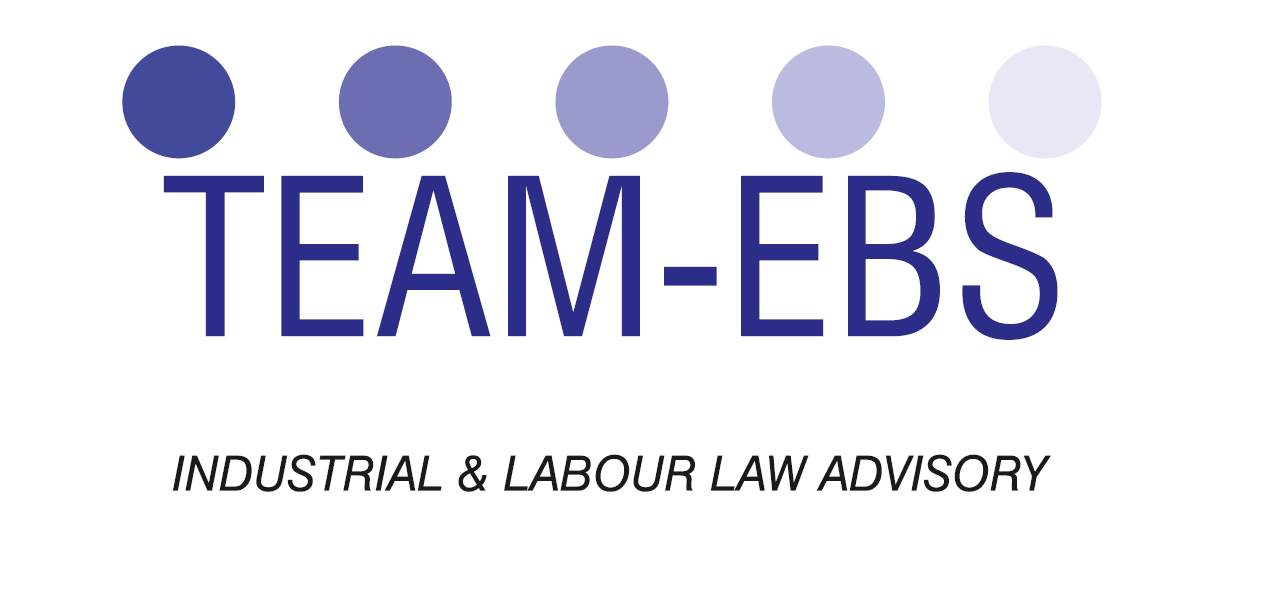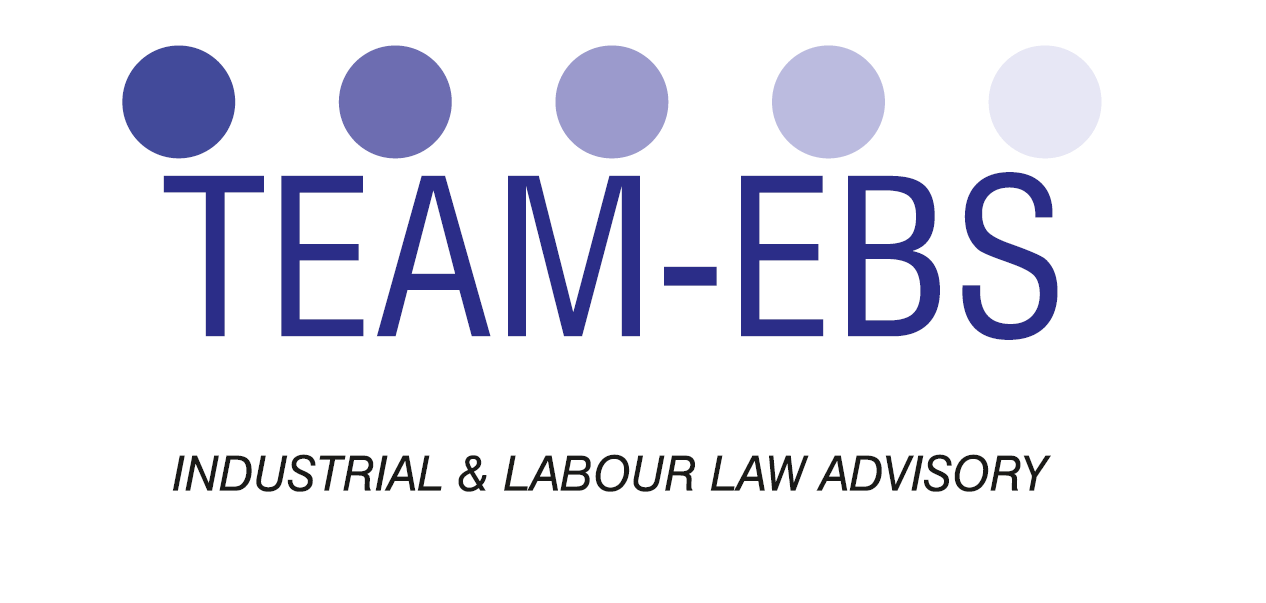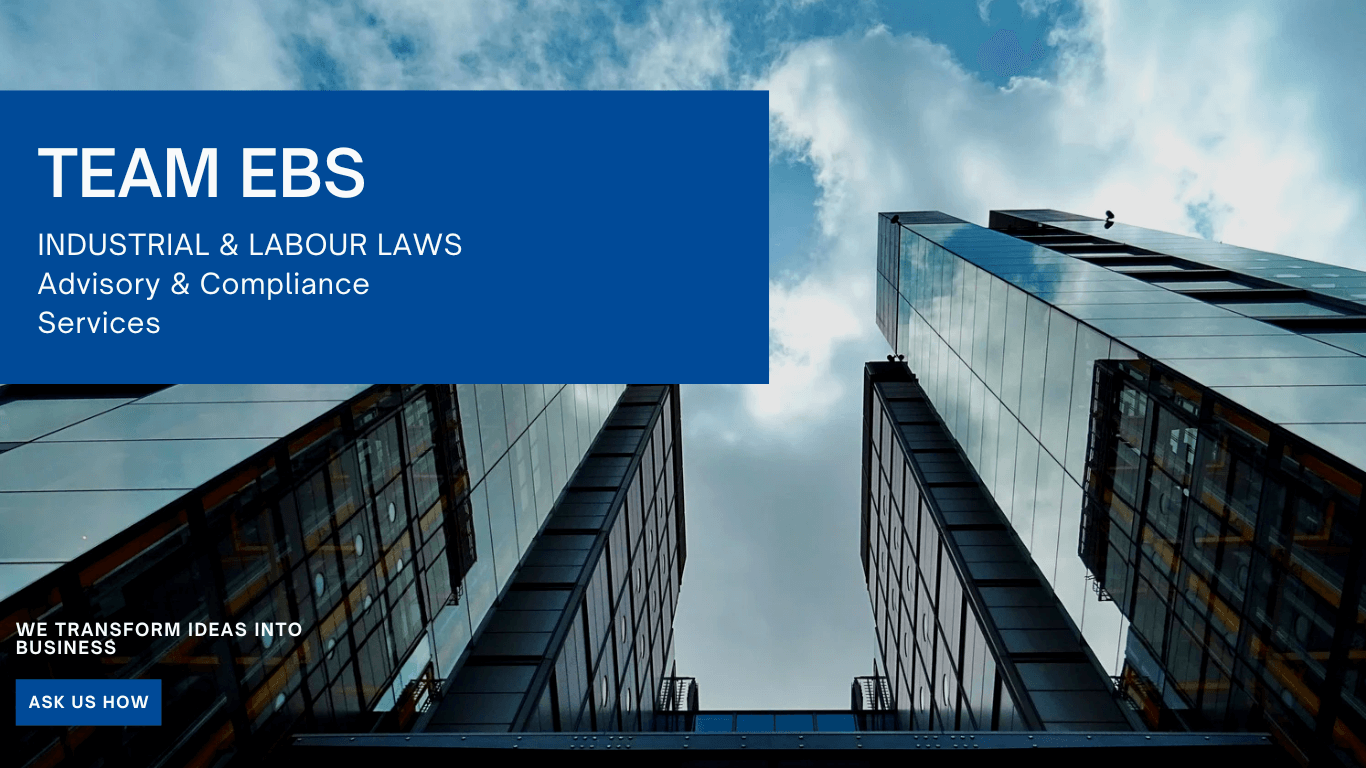Are you Doing Business?

Routine support from Professionals for Industrial & Labour Laws
Timely compliance with various statues & Labour Laws to avoid penalties/fines.
Reduction in fixed manpower cost by way of outsourcing.
No frequent recruitment for HR/IR.
No further outsourcing or sub letting of client’s assignment.
WHY Connect with Team EBS?
Organization data stability and confidentiality.
Avoidance of litigation and associated costs arising out of various non compliance.
Complete maintenance of compliance and other statutory records.
Through understanding of Government bodies & functioning for Liasoning Work.
Why Choose "TEAM EBS"

- STABLE RESOURCE
- DATA CONFIDENTIALITY
- DATA BACK UP
- TIMELY COMPLIANCES
Frequently Asked Question
Are you doing Business and worried about Right Compliance Solution?
- What does compliance mean in business?
Compliance applies to almost every business in one way or another, whether you’re head of a large company or a small business owner.
Compliance in business means adhering to a set of rules, Guidelines or laws laid down under various Business, Industrial & Labour Acts.
Compliance in business means adhering to a set of rules, Guidelines or laws laid down under various Business, Industrial & Labour Acts.Compliance is mandatory.
Businesses must obey certain regulatory compliance obligations, such as minimum wage laws or environmental, health, and safety regulations.
An effective compliance management system helps an organization manage all its compliance obligations. Non-compliance with laws and government regulations can result in significant legal disputes, penalties, and even criminal charges, plus reputation risks that might scare away customers, employees, and business partners.
- Why Does Compliance Matter?
As your company grows, compliance will become critical in hiring, termination, employment discrimination, harassment, safety, wages, payroll, and benefits.
Ultimately, corporate compliance promotes sound business standards, which leads to a positive working environment and a healthy culture.
Compliance matters because:
It lowers the risk of possible fines, sanctions, labor strikes, lawsuits, or company closures.Safety and security measures help prevent injuries, fires, or evacuations of buildings that can result in downtime.
Compliance with legal requirements and optional certifications instills trust among customers and boosts your competitive advantage.Employee retention increases when workers know that they are in a safe, professional, and equitable environment.
- What Is Compliance in Business?
Compliance means that a company should have adequate policies and procedures in place to meet compliance requirements.
In addition, an organization must have a precise record-keeping system to document those procedures and relevant audit trails.Organizations must investigate which laws and regulations apply to their business to assure accountability, fairness, and transparency with their stakeholders.
- Do All Businesses Have to Worry About Compliance?
Yes.
Compliance does not just apply only to large enterprises. Small business owners might have fewer or different compliance obligations, but they must still comply with all applicable external and internal business requirements. Every company must investigate which laws and regulations apply to its own operations.
Small and Medium Scale Businesses should designate a chief compliance officer accountable for managing compliance requirements. Large companies may have a compliance department to keep track of the different business compliance requirements. This department will monitor all of a company’s compliance guidelines, corrective actions, and projects.
The compliance professionals at TEAM EBS can assist you in developing your compliance risk management program and streamlining processes.
Companies don’t have to worry about their compliance posture because TEAM EBS monitors it throughout the entire lifecycle. It automatically updates with the latest regulations and data protection requirements.
FAQ
Your Guide to Professional Traffic Q&A

1. As per the definition of wages under the Code, do wages change every month as the exclusions such as “commissions” are also variable?
There are possibilities of “wages” becoming dynamic and varying every month for employees, receiving say for example, “commission” depending upon their performance. Though the commission is excluded from wages, if it is sufficiently high to make the total of all excluded allowance exceed 50% of total remuneration, then such sum that exceeds 50% has to be added back to the wages. Therefore, it is possible that the wage shall vary from one month to the other.
What is the timeline prescribed for the full and final settlement of an employee exiting under the Code? Should it happen in 2 days of the last working day or month-end/ salary processing day?
As per Section 17(2) of the Code on Wages, the wages shall be paid within two working days. When an employee has been removed, dismissed, retrenched, resigned from service, or became unemployed due to the closure of the establishment, the wages payable to him shall be paid within two working days of his removal, dismissal, retrenchment or, as the case may be, his resignation. Similarly, Leave Encashment shall be paid under the Occupational Safety, Health & Working Conditions, 2020, within 2 days of such termination. However, the term, Full and Final Settlement, normally includes other elements, for example, Gratuity. And for Gratuity, the Code on Social Security, 2020 and draft central Rules thereunder provide 30 days. Therefore, it is not the entire component of the Full and Final Settlement that needs to be settled in 2 days.
Does the basic wage need to be maintained at 50% of CTC across all employees where DA is not applicable?
The new “wage” definition is certainly complex, with inclusions and certain exclusions with a cap on exclusions @ 50% of the total remuneration. Therefore, in a situation where the only component included is Basic, and is less than 50% of the remuneration, the proviso of the definition would ensure that the “wage” is 50% of the remuneration. For all practical purposes like calculating contributions for PF/ESIC, the calculation for gratuity etc, the “wage” will be 50% of the Remuneration, even if the Basic is less than 50%. However, if the Basic is more than 50% of remuneration, then the wage for such calculation would be the actual Basic.
If a contract employer has their establishment in more than one State, what type of CLRA license should they obtain? Do they need to obtain separate licenses for each State?
As per the OSH Code, a contractor who has an establishment in more than one State and is desirous of obtaining a license for supplying or engaging contract labour or undertaking or executing the contract work in more than one State or for pan-India makes provision for “National License” for a contractor but this is subject to requisite qualifications or criteria to be fulfilled by the Contractor as may be prescribed by the Central Government.
Will the applicability of provisions & Rules under the Contract Labour chapter have different threshold limits or it will be consistent as provided in Codes? What about the threshold limit for applicability of the Factories Act?
While the OSH Code applies to all establishments having 10 or more employee therein, the specific chapters thereunder would apply based on the subject matter it governs.The Contract Labour chapter will only apply to establishments or contractors employing 50 or more contract workers.And the Factories chapter would apply to factories (without the aid of power) employing 40 or more workers and if they are running with aid of power, then 20 or more workers therein. Such factories would also require a licence in the same manner as required currently under Factories Act. But factories having less than 20 employees (but more than 10 employees) will have to comply with the registration requirement under the OSH Code.
Is the employment of women in all types of work and night shift permitted?
Chapter X of the OSH Code prescribes special provision relating to the employment of women and are entitled to be employed in all establishments for all types of work and they may also be employed, with their consent before 6 a.m. and beyond 7 p.m. i.e., night. But this is subject to conditions relating to holidays, working hours and adequate safety, which shall be prescribed in the Rules.
How is Gratuity computed as per the new Labour Codes? When is it supposed to be paid to an exiting employee?
Gratuity calculation remains the same as per the Payment of Gratuity Act. However, the wages to be considered may be impacted based on the salary structure of an employee which should be in line with the definition of wages as per the new Codes.
Do we need to change any policies or procedures or is it only the wage structure?
Yes. It is not only the definition of wage that is expected to change. For example, the concept of who is a “Worker” is now clearly defined. The term “Employee” is also defined clearly, and it includes “Worker”. There are few provisions such as the ones that regulate working hours, overtime, annual leave that apply only to workers and not all employees. Similarly, all IR Code provisions apply only to workers. Therefore, it is important that every employer relooks at their HR policies, organization structure, role, and responsibility of every employee to understand the impact of provisions of the code and realign as required.
Does an employer have to pay overtime to all the types of employees in their establishment?
OT applies to all the workers including the person engaged in supervisory levels earning less than INR 18,000 (Rupees Eighteen Thousand only) per month. But it does not apply to employees engaged in a supervisory capacity drawing a wage exceeding INR 18,000 (Rupees Eighteen Thousand only) per month or such other amount as may be notified by the Central Government and to employees engaged in a managerial and administrative capacity.
Are the Standing Orders applicable for IT/ITES sectors?
Yes! The Standing Orders are applicable for the IT/ITeS sector as well unless no specific exemption is granted.As per the new definition of “Industry” under the Industrial Relations Code, 2020, all IT/ITeS companies would be Industry. All their establishments would be Industrial Establishments. Therefore, as per the IR Code, any such establishment engaging 300 or more workers would not obtain a Standing Order. They can either adopt the Model Standing Order or get their Standing Order certified.
Subscribe to " TEAM EBS"
SEE WHAT THEY SAY
“TEAM EBS” provides standard solutions which help businesses of all types and sizes to handle industrial relations successfully. It addresses awkward situations that can arise while managing people at the workplace.
"TEAM EBS ADVISORY" can be a excellent business compliance partner since a team of experts provides end to end solutions and precautionary measures to be taken in various subjects like Factories Act, Shops Establishment Act, Employees Provident Fund, ESI, Gratuity, Minimum Wages & Payment of wages Act, Sexual Harassment of Women at Workplace etc
ANNUAL SUBSCRIPTION
Starts From
Rs. 2500/-
FROM JANUARY - DECEMBER
Subscribe to “TEAM EBS” Advisory & Compliance Services and ensure total compliances under Labour & Industrial Laws.
What Our Cliants Say About US
Few Testimonials From Recognized Clients

"The team at "Team EBS" is exceptional. Their comprehensive understanding of labor law and ability to convey complex information in an understandable way has been incredibly beneficial for our HR department. We have greatly appreciated their prompt and thorough responses to our inquiries."
David Brown
COO of Tech Innovations Inc.

"Team EBS" has been an invaluable partner in managing our payroll. Their attention to detail and promptness ensure that our employees are paid accurately and on time, every time. We no longer worry about compliance issues or errors, thanks to their expert support."
Mary Johnson
Owner of Johnson & Co.

"The payroll services provided by "Team EBS" have been exceptional. They are thorough, efficient, and always up-to-date with the latest payroll regulations. Their team’s expertise has saved us time and money, and we have complete peace of mind knowing our payroll is in capable hands."
Jason Statham
Lorem Ipsum

ACCELERATE YOUR BUSINESS COMPLIANCE JOURNEY WITH GOA’S LEADING AND MOST TRUSTED COMPLIANCE & PAYROLL SUPPORT PARTNER
Contact Info
SOUTH GOA OFFICE: 308, Reliance Magnum, 3rd Floor, Madel Margao Goa. 403601
NORTH GOA OFFICE: P-12,CITI CENTRE ,Patto Business Centre, Nr KTC Bus Stand ,Panaji Goa 403001
Email ID: support@ebsgoa.com /ebsgoa@yahoo.in


